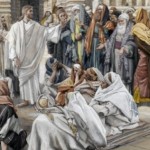 Matthew 26:57-75
Matthew 26:57-75
“What do you think of this Jesus?”
Careful how you answer!
They answered and said, “He is deserving of death.” Then they spat in His face and beat Him, and others struck Him with the palms of their hands, saying, “Prophesy to us, Christ! Who is the one who struck you?
Really? What could a good moral teacher and healer of sicknesses possibly have done to merit death? Maybe the religious leaders of the day were just jealous, and, yes, that’s part of the answer. There is some truth in their answer that Jesus is deserving of death, from their perspective. It’s all summed up in a nice, neat syllogism they all carried around in their hearts and heads. It went like this:
Major Premise: Under God’s Law, anyone who commits blasphemy deserves to die.
Minor Premise: Jesus has committed blasphemy.
Conclusion: This Jesus must die.
It’s all there in black and white. There’s no escaping it: once you accept the premises of a syllogism then the conclusion is inevitable.
The problem is that we humans often begin with wrong premises, ones that are sometimes terribly, tragically wrong. And such is the case today. Looking at the syllogism, it’s easy to see what went wrong: it’s the minor premise. Jesus did not, in fact, commit blasphemy.
But the Jews certainly thought He did. Why would they think that? Isn’t blasphemy about taking the Lord’s name in vain and using it as a curse word? But blasphemy has a much broader meaning as well. According to Webster’s [1913 ed], blasphemy is “An indignity offered to God in words, writing, or signs; impiously irreverent words or signs addressed to, or used in reference to, God; speaking evil of God; also, the act of claiming the attributes or prerogatives of deity. When used generally in statutes or at common law, blasphemy is the use of irreverent words or signs in reference to the Supreme Being in such a way as to produce scandal or provoke violence.”
And there it is: “the act of claiming the attributes or prerogatives of deity.” That was why the high priest, scribes, and elders said that Jesus deserved death: He had blasphemed. He had claimed not only to be the Messiah but dared to say even more. Caiaphas the high priest asks Jesus: “I put you under oath by the living God. Tell us if you are the Christ, the Son of God.”
Silent before, now Jesus answers. “It is as you said.”
In other words, “Yes, I am the Christ, the Son of God.”
More than this, He claimed to be the Son of Man of Daniel 7 sitting on the right hand of power of Psalm 110, coming on the clouds of heaven. Whatever the real motives of the Jewish leaders, they had enough justification for them to condemn Him. Here was one who not only claimed to be the Messiah but also claimed to be divine. What further need do we have of witnesses?
What do we make of such a claim? When looked at from the point of view of Caiaphas, the scribes, and the elders, such a claim to be both the Messiah and God seem preposterous. If you’re the Christ, prophesy who is the one who struck you? You can’t be the high priest, because I, Caiaphas, have inherited the high priesthood from my father-in-law Annas. If you’re the king, then why do you come in such low estate. And if you’re God, then why don’t you call down twelve legions of angels to save you?
It must have seemed as if the powers of this world had everything covered. Rome was still king of the hill, and Israel a lackey of Rome. Yes, there’d been a little trouble recently but the ringleader is about to be dealt with. Even after we come to the end of Matthew 28, it seems as if the world went on as normal and as if nothing had changed.
And today, looking outside my window to the houses and street below, it looks pretty much like any other day. This story about Jesus is tucked away neatly in my Bible and is safely contained within its pages.
But there, we’ve done it again! We’ve swallowed a fallacious premise, and so our whole conclusion about the ordinariness of our lives and the power of God is in error. We’ve gladly gobbled up the religion of materialism and scientism and live according to the following syllogism (though unconsciously):
Major premise: The visible world is all that exists.
Minor premise: God is not visible.
Conclusion: God does not exist.
Now I’m not saying that this is what any of us would ever actually say or believe, but it’s how we act so much of the time. All around us are the Caiaphases and scribes and elders and armed multitude, and they seem to govern the world. It sure seems like they’re in charge and that it is the kingdom of man that, in the end, will prevail.
But look again at verse 64, Jesus’ answer. To those in charge of the world at that time He said that He was the Christ, the Son of God and that they would see the Son of Man sitting at the right hand of the Power and coming on the clouds of heaven. No one except Jesus, not even the apostles yet, could see what Jesus saw. The One who had fulfilled all prophesy now makes a prophesy of His own, and it was sure to come to pass.
That generation saw the Son of Man, sitting at the right hand of the Power and coming on the clouds. In Daniel 7, the Son of Man comes with the clouds of heaven to the Ancient of Days, where He was given dominion and glory and a kingdom. The coming of the Son of Man on the clouds is the Son of Man ascending on the clouds into heaven and to the right hand of the Father. “Now when He had spoken these things, while they watched, He was taken up, and a cloud received Him out of their sight” (Acts 1:9).
It is in the Resurrection and the Ascension that we see Jesus’ words fulfilled. It is only after the Resurrection and Ascension that He receives the kingdom promised to Him.
But all of these things have happened for us: the prophesy of Jesus has been fulfilled. And yet sometimes we’re tempted to play by the old rules, to act as if nothing special happened 2000 years ago. On Good Friday, it must have seemed as if God’s side and His people were losing. The bad guys were in control and were about to squash the last hope of salvation. But that’s not how the story ended. We know how it ended: with a complete victory for God!
And we know how our story will end as well. No matter how dark things may seem today, no matter how much evil men still seem to triumph in this world, Christ has won the victory! It might well be, as it was with Jesus, that we will need to lose or appear to be losing for a season, so that the will of the Father might be fulfilled.
But in the end, those who stand with Jesus and proclaim Him as Messiah and God will rule with Him, and all of those who appeared to have been winning will have their kingdoms crumble into the sea.
Prayer: O Lord God, our Governor, we beseech Thee, of Thy mercy, that we may have the heavenly vision, and behold things as they seem unto Thee, that the turmoil of this world may be seen by us to be bringing forth the sweet peace of the eternal years, and that in all the troubles and sorrows of our own hearts we may behold good, and so, with quiet mind and inward peace, careless of outward storm, we may do the duty of life which brings to us a quiet heart, ever trusting in Thee. We give Thee thanks for Thy mercy. We beseech Thy forgiveness of our sins. We pray Thy guidance in all things, Thy presence in the hour of death, Thy glory in the life to come. Of Thy mercy hear us, through Jesus Christ our Lord. Amen. (George Dawson)
Points for Meditation:
1. How consciously throughout the day do you direct your thoughts toward God? How many of your decisions are governed by an appeal to Him?
2. Are there times when you feel you should stand up and proclaim that you are a Christian?
3. If you are facing a trial in your life, and evil seems to be triumphing, remember the end of your life’s story!
Resolution: I resolve to hope today in Christ and His Kingdom, even when things look dark.
© 2012 Fr. Charles Erlandson














